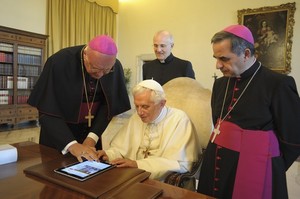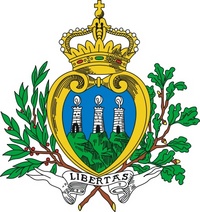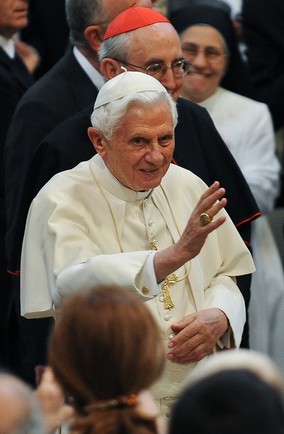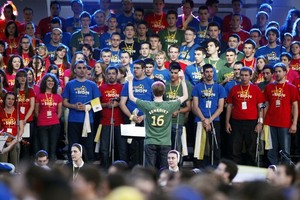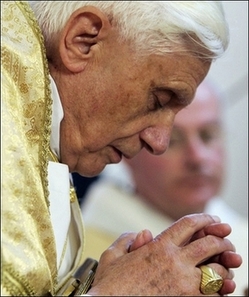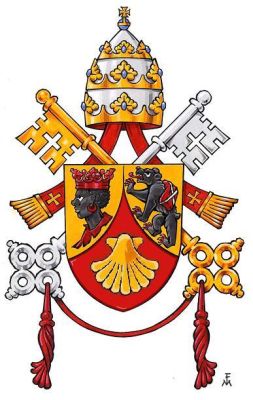
The Church celebrates today great solemn feast of Saints Peter and Paul, it is also the 60th anniversary of Pope Benedict's priestly ordination as well as the day the See of Constantinople sends a delegation to Rome to pray at the tombs of the two great saints and to meet with the Pope. Plus, it is the day in which the metropolitan archbishops who have been appointed in the last calendar year come to Rome to receive the palium (see below). The USA has for archbishops receiving their pallium today: San Antonio, Oklahoma City, Seattle and Los Angelos. All four of these archbishops are under 60. Watch the video clip.
"Non iam dicam servos, sed amicos" - "I no longer call you servants, but friends" (cf. Jn 15:15).
Sixty years on from the day of my priestly ordination, I hear once again deep within me these words of Jesus that were addressed to us new priests at the end of the ordination ceremony by the Archbishop, Cardinal Faulhaber, in his slightly frail yet firm voice. According to the liturgical practice of that time, these words conferred on the newly-ordained priests the authority to forgive sins. "No longer servants, but friends": at that moment I knew deep down that these words were no mere formality, nor were they simply a quotation from Scripture. I knew that, at that moment, the Lord himself was speaking to me in a very personal way. In baptism and confirmation he had already drawn us close to him, he had already received us into God's family. But what was taking place now was something greater still. He calls me his friend. He welcomes me into the circle of those he had spoken to in the Upper Room, into the circle of those whom he knows in a very special way, and who thereby come to know him in a very special way. He grants me the almost frightening faculty to do what only he, the Son of God, can legitimately say and do: I forgive you your sins. He wants me - with his authority - to be able to speak, in his name ("I" forgive), words that are not merely words, but an action, changing something at the deepest level of being. I know that behind these words lies his suffering for us and on account of us. I know that forgiveness comes at a price: in his Passion he went deep down into the sordid darkness of our sins. He went down into the night of our guilt, for only thus can it be transformed. And by giving me authority to forgive sins, he lets me look down into the abyss of man, into the immensity of his suffering for us men, and this enables me to sense the immensity of his love. He confides in me: "No longer servants, but friends". He entrusts to me the words of consecration in the Eucharist. He trusts me to proclaim his word, to explain it aright and to bring it to the people of today. He entrusts himself to me. "You are no longer servants, but friends": these words bring great inner joy, but at the same time, they are so awe-inspiring that one can feel daunted as the decades go by amid so many experiences of one's own frailty and his inexhaustible goodness.
